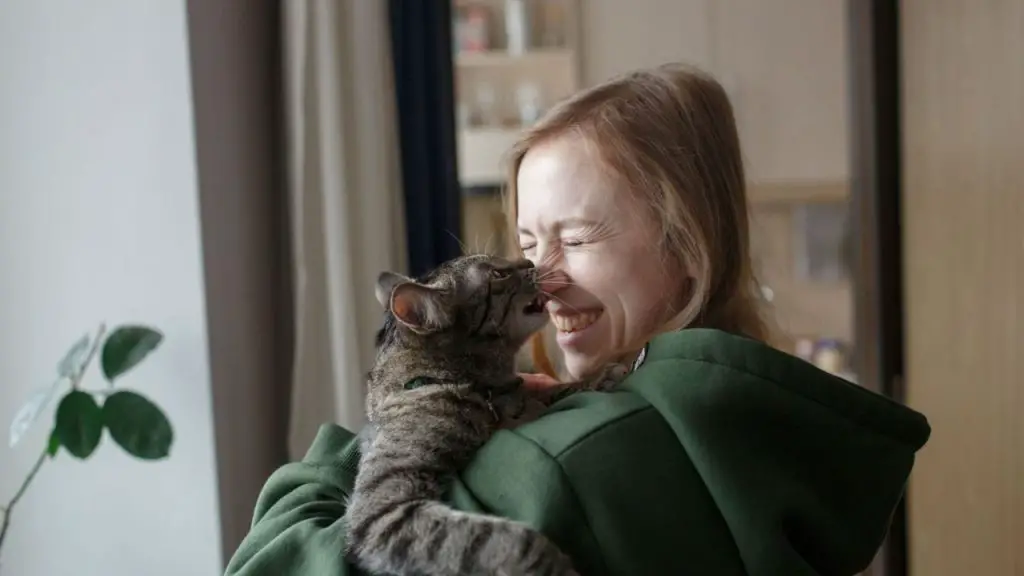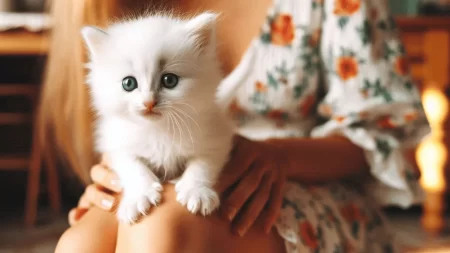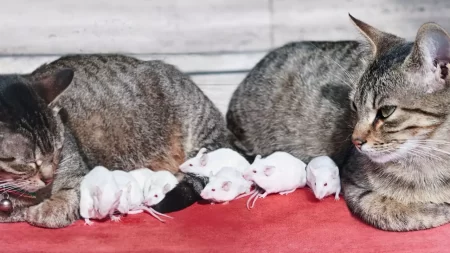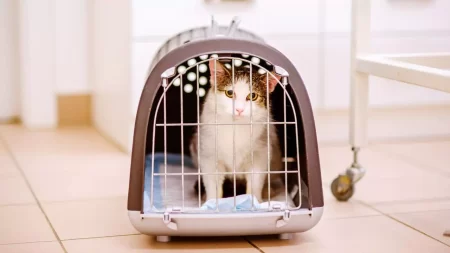Cats often show affection by gently biting their owner’s nose, mimicking the grooming behavior. This bonding behavior is quite common among felines and typically happens when both the cat and the owner are relaxed.
Understanding Cat Behavior
To get to the root of nose-biting in cats, we must first grasp their conduct. These feline creatures are habitual and display consistent patterns of behavior. Communication for them involves multiple forms, including bodily cues, vocalization, and scent. Additionally, their innate predatory nature equips them with sharp instincts, which they employ to catch prey. With a curious nature, they enjoy investigating their surroundings and can be fiercely territorial, guarding their personal space.
Why Do Cats Bite Noses?
Let’s explore why cats sometimes nip at your nose. Despite our general grasp on feline behavior, this curious behavior can have a few underlying causes. Here are some reasons why your furry feline might be more inclined toward this particular conduct:
1. Playfulness
Cats enjoy playful behavior and frequently utilize their mouths and paws to engage in play with their companions. Occasionally, they may engage in biting behavior as a playful activity, particularly when they feel lively or require attention.
2. Affection
Cats display their affection in various manners, including nibbling or biting their owners’ noses as a demonstration of love. This behavior often occurs while snuggling or snoozing alongside their humans.
3. Exploration
Cats are curious creatures and may bite your nose out of curiosity. They use their mouths to explore their surroundings, and sometimes, your nose may be the object of their curiosity.
4. Fear or Aggression
In some cases, biting can be a sign of fear or aggression. If your cat feels threatened or scared, they may bite to protect themselves. They may also do this if they’re in pain or uncomfortable.
What Are the Potential Risks of Cat Nose Biting and How to Prevent Them?
Although cat nose biting is natural, it can have negative consequences. The most noticeable risk is harm or unease to the person being bitten. Cats’ teeth and jaws can cause scratches or puncture wounds, which may become infected if not handled properly. Additionally, cat nose biting can transmit diseases like cat scratch fever, which causes flu-like symptoms, and bacteria like Pasteurella multocida, which can cause infections in humans.
Furthermore, this behavior can indicate underlying behavioral issues, such as anxiety, aggression, or fear, which can worsen if not treated. Therefore, it’s crucial to discourage this behavior and consult with professionals if necessary. By redirecting your cat’s behavior, setting limits, and employing positive reinforcement, you can promote good habits and lower the risk of harm or discomfort.
Here are some tips on how to stop your cat from biting your nose:
1. Redirect their behavior
When your cat starts to bite your nose, redirect their behavior by offering them a toy or a treat. This will help them focus their energy on something else and distract them from biting.
2. Avoid rough play
Avoid rough play with your cat, such as wrestling or playing with your hands. This can encourage biting behavior and may make it difficult to stop.
3. Set boundaries
Set boundaries with your cat and teach them what behaviors are acceptable and what are not. For example, you can teach them to play gently and not to bite or scratch.
4. Use positive reinforcement
Use positive reinforcement to encourage good behavior. Reward your cat with treats or praise when they play gently or refrain from biting.
5. Consult with a veterinarian
Consider seeking guidance from a veterinarian if your feline friend continues to display biting tendencies. A qualified vet could provide valuable insights on how to alter your cat’s actions or eliminate any concealed medical concerns.
What Are Some Alternative Ways for Your Cat to Show Affection Instead of Biting Your Nose?
To prevent your cat from biting your nose, it’s crucial to steer their conduct towards alternative forms of expressing love. Consider these substitute methods for your feline to display affection besides nipping your nose:
- Headbutting – Many cats will gently headbutt their owners as a sign of affection. This is an effortless method for them to express their concern.
- Purring – Cats emit a pleasant and soothing sound known as purring, which indicates their contentment and joy. When a feline is curled up and purring while nestled beside you, it is a clear indication that they are at ease and feel secure in your presence.
- Kneading – Some cats will knead their owners with their paws as a sign of affection. This behavior is similar to the way they knead their mother’s belly when they’re nursing.
- Licking – Cats may lick their owners as a way to groom them or show affection. If your cat is gently licking your hand or face, it’s a sign that they trust you.
- Cuddling – Cats love to snuggle with their owners and may curl up on their lap or next to them on the couch. This is a non-invasive way for them to show affection and feel close to you.
By encouraging these alternative behaviors, you can help your cat develop good habits and reduce the risk of nose biting. Remember to reward positive behavior with treats or praise to reinforce good habits.
Can Cat Nose Biting be a Sign of a Deeper Behavioral or Medical Issue?
Yes, cat nose biting can sometimes be a sign of a deeper behavioral or medical issue. For example:
- Fear or Anxiety – If your cat is feeling fearful or anxious, they may resort to biting as a way to protect themselves. This behavior may be triggered by certain situations, such as loud noises or unfamiliar people.
- Aggression – Cat nose biting can indicate aggression towards other cats, animals, or humans. Such behavior may come along with other aggressive actions like hissing or growling.
- Pain or Discomfort – Cats may bite if they’re hurting or uneasy. This could be caused by a health concern, like toothaches or joint inflammation, or an accident. For instance, if a cat is accidentally stepped on, they may bite out of pain. It’s important to be cautious around cats who are showing signs of discomfort, as they may lash out unexpectedly.
- Lack of Socialization – Cats that were not socialized properly as kittens may have trouble interacting with humans or other animals, which may lead to biting behavior.
- Attention-Seeking – Some cats may bite as a way to get attention from their owners. This behavior may be more common in cats that are bored or not getting enough stimulation.
If your feline frequently bites its nose or displays other worrying conduct, it’s vital to consult a vet or animal behavior expert for guidance. They can diagnose potential medical or behavioral problems and suggest strategies for altering your cat’s behavior.
Conclusion
In conclusion, cats may bite noses for several reasons, including playfulness, affection, exploration, fear, or aggression. While this behavior may be natural for them, it’s important to discourage it to prevent injury or discomfort. By redirecting their behavior, avoiding rough play, setting boundaries, using positive reinforcement, and consulting with a veterinarian if necessary, you can help your cat develop good behavior habits.
FAQs
Is it normal for cats to bite their noses?
Yes, biting can be a natural behavior for cats, but it’s essential to discourage it to prevent any potential injury or discomfort.
Why do cats nibble on their noses?
Cats may nibble on noses as a form of affection, playfulness, or curiosity.
Should I punish my cat for biting my nose?
No, punishment is not an effective way to modify a cat’s behavior. It’s better to redirect their behavior and use positive reinforcement to encourage good behavior.
Can cats transmit diseases through biting?
Yes, cats can transmit diseases through biting, such as cat scratch fever. It’s important to seek medical attention if you experience any symptoms after being bitten.







